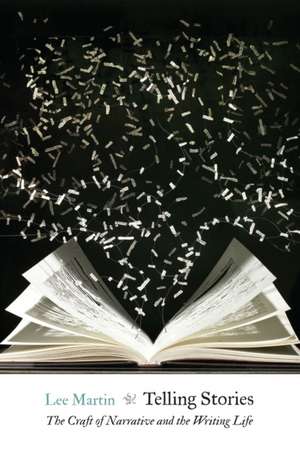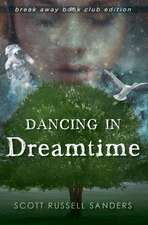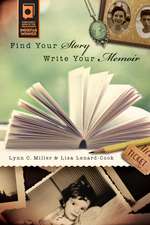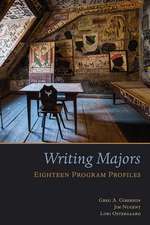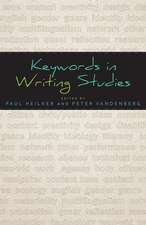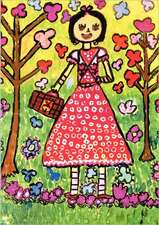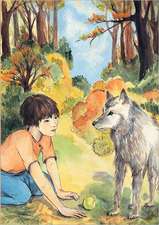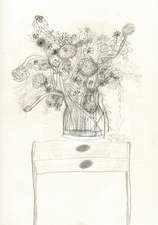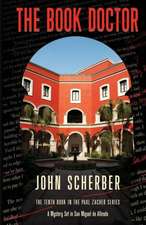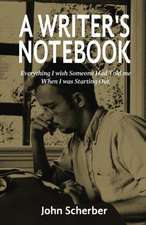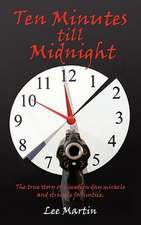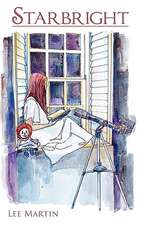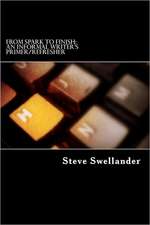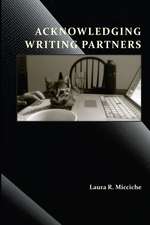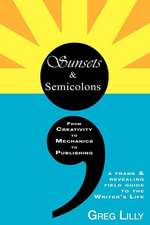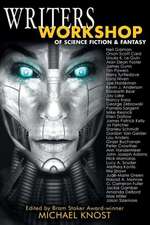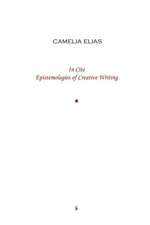Telling Stories: The Craft of Narrative and the Writing Life
Autor Lee Martinen Limba Engleză Paperback – 30 sep 2017
A prolific and award-winning writer, Lee Martin has put pen to paper to offer his wisdom, honed during thirty years of teaching the oh-so-elusive art of writing. Telling Stories is intended for anyone interested in thinking more about the elements of storytelling in short stories, novels, and memoirs. Martin clearly delineates helpful and practical techniques for demystifying the writing process and provides tools for perfecting the art of the scene, characterization, detail, point of view, language, and revision—in short, the art of writing. His discussion of the craft in his own life draws from experiences, memories, and stories to provide a more personal perspective on the elements of writing.
Martin provides encouragement by sharing what he’s learned from his journey through frustrations, challenges, and successes. Most important, Telling Stories emphasizes that you are not alone on this journey and that writers must remain focused on what they love: the process of moving words on the page. By focusing on that purpose, Martin contends, the journey will always take you where you’re meant to go.
Martin provides encouragement by sharing what he’s learned from his journey through frustrations, challenges, and successes. Most important, Telling Stories emphasizes that you are not alone on this journey and that writers must remain focused on what they love: the process of moving words on the page. By focusing on that purpose, Martin contends, the journey will always take you where you’re meant to go.
Preț: 112.18 lei
Nou
Puncte Express: 168
Preț estimativ în valută:
21.47€ • 22.15$ • 17.91£
21.47€ • 22.15$ • 17.91£
Carte disponibilă
Livrare economică 06-20 martie
Preluare comenzi: 021 569.72.76
Specificații
ISBN-13: 9781496202024
ISBN-10: 1496202023
Pagini: 258
Dimensiuni: 152 x 229 x 20 mm
Greutate: 0.39 kg
Editura: Nebraska
Colecția University of Nebraska Press
Locul publicării:United States
ISBN-10: 1496202023
Pagini: 258
Dimensiuni: 152 x 229 x 20 mm
Greutate: 0.39 kg
Editura: Nebraska
Colecția University of Nebraska Press
Locul publicării:United States
Notă biografică
Lee Martin is a distinguished professor of English and teaches creative writing at Ohio State University. He is the author of several books, including Such a Life (Nebraska, 2012), From Our House (Nebraska, 2009), The Bright Forever (finalist for the 2006 Pulitzer Prize for fiction), and Turning Bones (Nebraska, 2003).
Cuprins
Acknowledgments
Introduction
Part 1. Structure: Once upon a Time
Writing the Opening of a Short Story
Juggling Balls: An Exercise for Opening a Short Story
Using Mystery to Open Your Story
Trouble? I’ve Seen Trouble
Making a Scene
The Inevitable Surprise
Framing the Story
Character and Incident
I Didn’t Expect That
One Way to Structure a Memoir
Organizing the Memoir
The Layers of Memoir
I Was Wearing Them the Day: Touchstone Moments and Details for the Fiction Writer
Yogi Berra and the Art of Flash Nonfiction
Mad Libs for Creative Nonfiction
Enough about Me, Tell Me What You Think about Me
Shrinking a Novel
Preparing the Final Scene by Avoiding Conflict
Here We Are at the End
Taking Care at the End: The Art of Misdirection
Part 2. Characterization: There Were Three Little Pigs
On a Mother’s Birthday, a Writer Loves the World
Tightening the Screws: Putting Pressure on Our Characters
Contradictory Characters
Odd Couples: The Writer as Matchmaker
Characterization in the Personal Essay
Creating Richer Characters
The Art of the Snark
Part 3. Detail: A House of Straw, a House of Sticks, a House of Bricks
My Mother Gives Me a Writing Lesson
Get the Particulars Right
Know Your Place
That Kind of Place: An Argument for Nostalgia
Nostalgia and the Memoirist
A Detail and All It Can Do
The Places We Know: What Richard Ford Taught Me
Daydreaming Your Memoir
The Heart’s Field: Place in Fiction
Oh, Those Pesky Facts: What’s a Memoir Writer to Do?
Memoir and the Work of Resurrection
Using Photos in Memoir
Ordinary Details in Memoir
Connecting Particulars
Context
Part 4. Point of View: “Little Pig, Little Pig, Let Me Come In”
Your Point of View Choice Creates the Effect of the Story
The Inner Story of the Writer’s Thinking
Finding a Different Lens
Memoir and the Future
Living Full: Avoiding Sentimentality in Memoir
Into the Fire
Part 5. Language: “Not by the Hair of My Chinny Chin Chin”
Stylin’
The Value of a Beautiful Sentence
The Art of the Twerk: Writing the Miley Cyrus Way
Communal and Personal Voices
Voice in Creative Nonfiction
Personae and Tone in Fiction
Paying Attention to Form in Flash Nonfiction
The Kite
The Thing Said: Ten Thoughts on Writing Dialogue in Memoir
Alligators and Marshmallows: A Lesson in Humor
Comedy in Fiction
Part 6. Revision: And the Third Little Pig Lived Happily Ever After
Taking Flight: First Drafts
Felt Sense: Focusing on Revision
More Revision Activities
The Doorway between Memoir and Fiction
Proverbs for Revising a Novel
Part 7. The Writing Life: The Two Little Pigs Now Felt Sorry for Having Been So Lazy and Built Their Houses with Bricks
My Mother’s Gifts to Me
My Aunt among the Rocks
Five Ways We Keep Ourselves from Writing
Five Things All Writers Can Control
Reading Like a Writer
Writing to Preserve
Travel and the Writer
Slowing Down
Our Quiet Places
What Fills Us
The Books and the Boys of Summer
A Writer Writes: A Lifelong Apprenticeship
Defeating Writer’s Block
Ten Thoughts on the Writing Life
Keep Facing the Blank Page
Introduction
Part 1. Structure: Once upon a Time
Writing the Opening of a Short Story
Juggling Balls: An Exercise for Opening a Short Story
Using Mystery to Open Your Story
Trouble? I’ve Seen Trouble
Making a Scene
The Inevitable Surprise
Framing the Story
Character and Incident
I Didn’t Expect That
One Way to Structure a Memoir
Organizing the Memoir
The Layers of Memoir
I Was Wearing Them the Day: Touchstone Moments and Details for the Fiction Writer
Yogi Berra and the Art of Flash Nonfiction
Mad Libs for Creative Nonfiction
Enough about Me, Tell Me What You Think about Me
Shrinking a Novel
Preparing the Final Scene by Avoiding Conflict
Here We Are at the End
Taking Care at the End: The Art of Misdirection
Part 2. Characterization: There Were Three Little Pigs
On a Mother’s Birthday, a Writer Loves the World
Tightening the Screws: Putting Pressure on Our Characters
Contradictory Characters
Odd Couples: The Writer as Matchmaker
Characterization in the Personal Essay
Creating Richer Characters
The Art of the Snark
Part 3. Detail: A House of Straw, a House of Sticks, a House of Bricks
My Mother Gives Me a Writing Lesson
Get the Particulars Right
Know Your Place
That Kind of Place: An Argument for Nostalgia
Nostalgia and the Memoirist
A Detail and All It Can Do
The Places We Know: What Richard Ford Taught Me
Daydreaming Your Memoir
The Heart’s Field: Place in Fiction
Oh, Those Pesky Facts: What’s a Memoir Writer to Do?
Memoir and the Work of Resurrection
Using Photos in Memoir
Ordinary Details in Memoir
Connecting Particulars
Context
Part 4. Point of View: “Little Pig, Little Pig, Let Me Come In”
Your Point of View Choice Creates the Effect of the Story
The Inner Story of the Writer’s Thinking
Finding a Different Lens
Memoir and the Future
Living Full: Avoiding Sentimentality in Memoir
Into the Fire
Part 5. Language: “Not by the Hair of My Chinny Chin Chin”
Stylin’
The Value of a Beautiful Sentence
The Art of the Twerk: Writing the Miley Cyrus Way
Communal and Personal Voices
Voice in Creative Nonfiction
Personae and Tone in Fiction
Paying Attention to Form in Flash Nonfiction
The Kite
The Thing Said: Ten Thoughts on Writing Dialogue in Memoir
Alligators and Marshmallows: A Lesson in Humor
Comedy in Fiction
Part 6. Revision: And the Third Little Pig Lived Happily Ever After
Taking Flight: First Drafts
Felt Sense: Focusing on Revision
More Revision Activities
The Doorway between Memoir and Fiction
Proverbs for Revising a Novel
Part 7. The Writing Life: The Two Little Pigs Now Felt Sorry for Having Been So Lazy and Built Their Houses with Bricks
My Mother’s Gifts to Me
My Aunt among the Rocks
Five Ways We Keep Ourselves from Writing
Five Things All Writers Can Control
Reading Like a Writer
Writing to Preserve
Travel and the Writer
Slowing Down
Our Quiet Places
What Fills Us
The Books and the Boys of Summer
A Writer Writes: A Lifelong Apprenticeship
Defeating Writer’s Block
Ten Thoughts on the Writing Life
Keep Facing the Blank Page
Recenzii
"[Martin's] own sentences are like bright sun-polished bones on a beach: sparse outlines nevertheless telling their own devastating story. No doubt aspiring writers will appreciate this honesty, and may find many of the writing prompts here helpful, particularly to unclog a blockage. But it is Martin's own literary journey that is most compelling."—Sara Lonsdale, Times Literary Supplement
"Martin combines writing tips with examples from literature and his own life and teachings. It's a clever, warm-hearted book for writers of fiction or creative nonfiction. It could be used in creative writing classes or kept on the desk for those days one needs a little shot of inspiration."—Debbie Hagan, Brevity
“‘Why shouldn’t good writing be hard? It’s our attempt at salvation,’ Lee Martin says in this exceptional book. Martin, through craft lessons, exercises, and literary examples, helps writers discover salvation one carefully selected word at a time.”—Sue William Silverman, author of Fearless Confessions: A Writer’s Guide to Memoir
“Lee Martin has long been one of my favorite writers of fiction and memoir, and now he’s one of my favorite writers of advice about the writer’s craft. Everyone who writes, or wants to, should read this wise and inspiring book.”—David Jauss, author of On Writing Fiction
